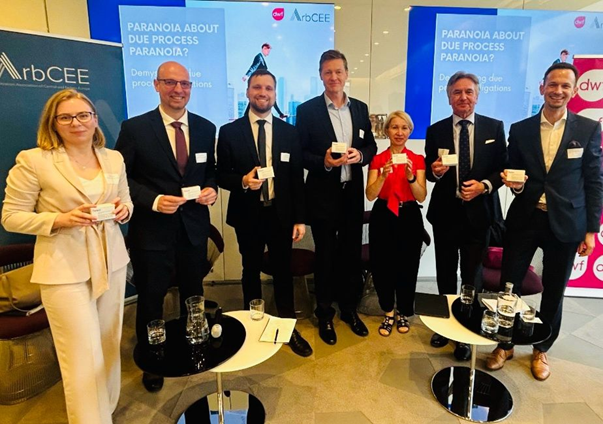THE AUTHOR:
Richard Schmidt, Founding & Managing Partner of SMARTLEGAL Schmidt & Partners
Is it possible to strike a fair balance between procedural efficiency and the respect of the parties’ fundamental procedural rights in arbitration? This was the basic issue of the panel discussion entitled “Paranoia About Due Process Paranoia” co-organized by ArbCEE and DWF Poland in Warsaw on 22 May 2024, during the Warsaw Arbitration Days.
About Due Process Paranoia
Arbitral procedures are characterized by party autonomy. Compared to state court litigation, the parties and the arbitrators have significant freedom to determine the “rules of the game.”
Nevertheless, a breach of the “fundamental fairness” of the arbitral procedure can cause serious problems in the post-award stage. Failing to uphold procedural justice can result not only in the annulment of the award at the seat of arbitration but also in the refusal of its recognition and enforcement by foreign state courts.
In recent years, a significant number of state courts have denied the legal effects of arbitral awards because of due process violations in several jurisdictions across Europe and beyond. This tendency gave birth to the phenomenon called “due process paranoia”, which is the fear arbitrators have that their award will be vacated on procedural grounds, paralyzing their ability to act decisively in certain tense situations.
While the respect of due process in arbitration is a must, the overcautiousness of arbitrators could undermine the “raison d’être” of arbitration, namely the fast and efficient resolution of commercial disputes.
The Panel

The above-mentioned panel discussed these issues in more detail. The event started with the opening speech of Piotr Bytnerowicz (ByArb, Poland) board member of ArbCEE, who highlighted the particular importance of this issue, especially in the Central Eastern European region, where state courts sometimes take an even more formalistic approach to arbitration.
The panel discussion was moderated by Maciej Jamka, (DWF Poland Jamka), who addressed thought-provoking questions to the panelist based on real-life situations.
The panel consisted of five arbitration practitioners from various European jurisdictions: Natalia Petrik, Counsel at Westerberg & Partners (Sweden), Violeta Saranciuc, Partner at Zamfirescu Racoti Vasile & Partners (Romania), Tomáš Richter, Attorney at JŠK, advokátní kancelář, s.r.o. (Czech Republic), Sergii Melnyk, Senior Associate at De Gaulle Fleurance (France) and Richard Schmidt, Founding Partner of Smartlegal Schmidt & Partners (Hungary).
Panel Discussions
The panelists discussed due process issues in various stages of the arbitral process.
The panel started discussing the subject matter from the perspective of arbitral institutions, since due process issues can emerge at the first stages of the arbitration process, e.g. in relation to the proper notification of the request of arbitration to the respondent, or in connection with the disclosure obligation of arbitrators related to their impartiality, independence, and availability. The panelists agreed that arbitral institutions play a crucial role in ensuring compliance with due process requirements from the very beginning of the arbitration procedure.
The next major topic was the issue of non-active parties in the arbitration proceedings, where one of the parties shall play tennis with an empty court. The panelists concurred that in such situations, arbitrators should avoid stepping in the shoes of the legal representatives of the absent party. Instead, they should preserve their neutrality and the transparency of the arbitral proceedings by opting for document-only arbitration wherever possible.
The panel also discussed whether a totally equal allocation of time for submissions and oral presentations at hearings is feasible. The practitioners agreed that while tribunals should strive for equality, it is more important to measure equality in the context of the entire arbitral process rather than insisting on uniformity in every minor detail. The key factor is ensuring that both parties have a reasonable opportunity to present their case.
Arbitral tribunals often face so-called “guerilla tactics”, where parties submit written pleadings deliberately late or ask for the postponement of hearings some days before the scheduled date. The panelists agreed that the most efficient way to handle such situations is to start with a well-drafted Procedural Order No.1. The PO1 should include a “modus vivendi” for these cases. Of course, arbitrators should not hesitate to enforce them. If the tribunal does not respect the procedural rules issued by itself, it is hardly possible to expect the parties to comply with them.
In addition to the above questions, the panelists discussed the delicate issue of sua sponte arbitrator initiatives, both in fact finding and in raising legal issues not pleaded by the parties. Instead of leaning back in their chairs, there are situations where arbitrators should take the initiative to investigate certain matters. It is undisputed that the jurisdiction of the tribunal is one such matter, but the nullity of the underlying transaction or the suspicion of corruption can also warrant greater activism from arbitrators. Of course, parties must be given a reasonable opportunity to comment on these issues.
Finally, the panelists summarized the general approach of state courts in relation to due process violations in arbitral proceedings in their respective jurisdictions.
The Solution: Paranol
Finally, to alleviate the digestion of the heavy subject matter with some humor at the end of the panel discussion, all participants of the event could take away one box of Paranol, a due process paranoia suppressor.

This “medicine” developed for educative purposes especially for arbitrators, containing 100 mg due care, 40 mg good will, 75 mg pragmatic sense of balance and 35 mg common sense, most probably can help overcome challenging due process issues in the hearing room and beyond.
Conclusion
While parties must be treated equally throughout the entire arbitration process and given a reasonable opportunity to present their case, these rights are not absolute. Arbitrators need to find a fine balance between these procedural rights and the time and cost efficiency of the arbitration. Without this balance, arbitration as a dispute resolution method can easily lose its attractiveness for business users.
ABOUT THE AUTHOR:
Richard Schmidt is Founding and Managing Partner of SMARTLEGAL Schmidt & Partners, a boutique law firm in Budapest, Hungary, focusing on commercial arbitration and litigation. He assists clients in complex commercial arbitration proceedings under the auspices of leading arbitration institutions, including ICC, HKIAC, HCAC and in ad hoc arbitrations under UNCITRAL Rules. His experience covers broad range of sectors, among others real estate &construction, international sale of goods (CISG), e-commerce, fin-tech. In addition, he regularly assists clients in setting aside and recognition & enforcement proceedings in Hungary.





